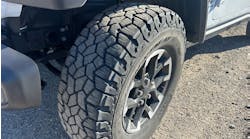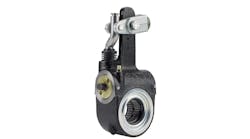Fleets and drivers will soon be able to deploy the fuel-economy and safety benefits of the SmarTire Tire Pressure Monitoring System (TPMS) by Bendix CVS on their trailers.
Bendix Commercial Vehicle Systems, the North American leader in the development and manufacture of leading-edge active safety and braking system technologies, expects to release SmarTire TPMS for trailers in the third quarter of 2012 as an aftermarket retrofit kit.
A typical kit would consist of eight wheel sensors, harnessing, and a wireless receiver. The company also intends to make SmarTire TPMS available to OE trailer manufacturers.
SmarTire technology continuously monitors the pressure and temperature of each tire on a commercial vehicle to provide real-time tire status information to the driver or maintenance technician.
Data display
When paired with the latest version of SmarTire for tractors, the SmarTire trailer system will wirelessly link with the trailer, displaying both the truck and the trailer tire information. Through this automatic link, the system will display the data provided by sensors monitoring the trailer tires on the existing TPMS display.
The SmarTire technology warns the driver of tire-related problems before they pose a safety hazard. The exclusive temperature compensation feature allows the system to provide earlier warnings of a tire problem.
Particularly relevant for trailers, the high-temperature warning is an invaluable feature that provides the driver with warning of a potential thermal issue, such as an overheated wheel-end due to a bearing or brake issue.
To assist fleets with managing the increasing costs of both fuel and tires, SmarTire TPMS provides drivers with the necessary information to keep their vehicle tires properly inflated. Tire underinflation by as little as 10 percent results in a 1.5 percent drop in fuel economy, which can increase fuel spending by up to $1,000 per year for a single truck. Underinflation by 20 percent results in a 30 percent reduction in tire life.
SmarTire’s in-vehicle dash display provides information including actual tire pressure and temperature for each wheel location, along with a deviation value that shows the amount of over- or underinflation from each tire’s cold inflation pressure (CIP).
This deviation value provides the user a deviation from target pressure, regardless of tire temperature, an important gauge because tire pressure rises when a tire’s temperature increases from use or outside conditions. For drivers and fleets, this means they can accurately maintain their pressures anytime – whether a truck has been sitting idle or has been driving for hundreds of miles.
Safety contribution
“SmarTire contributes to the overall safety of the driver and truck, while helping fleets address two of their operating top costs: fuel and tires,” said Jon Intagliata, product manager for TPMS at Bendix. “By monitoring trailer tires, as well as tractor tires, fleets will be able to truly maximize SmarTire’s safety, efficiency, and fuel economy benefits.”
Industry-wide, underinflation and excessive heat are responsible for 90 percent of tire failures, and almost half of all emergency service road calls are tire related. By eliminating a single road service call, SmarTire TPMS for trailers pays for itself.
Additionally, underinflated tires are considered violations in CSA (Compliance, Safety, Accountability) scoring, which can adversely affect a fleet’s and driver’s bottom line.
“Properly inflated tires also help ensure the proper performance of active safety technologies like Bendix ESP Electronic Stability Program full-stability system and Bendix Wingman Advanced – A Collision Mitigation Technology,” said TJ Thomas, Bendix director of marketing and customer solutions, Controls group.
SmarTire for trailers can be installed as a stand-alone system, or in conjunction with SmarTire tractor systems.
“Trailers are sometimes parked for long periods and may not receive the same level of maintenance attention as tractors,” Intagliata said.
“It will take the SmarTire trailer system a few moments to auto-detect the trailer, but once it does, the driver will know if any of that trailer’s tires are improperly inflated.”




